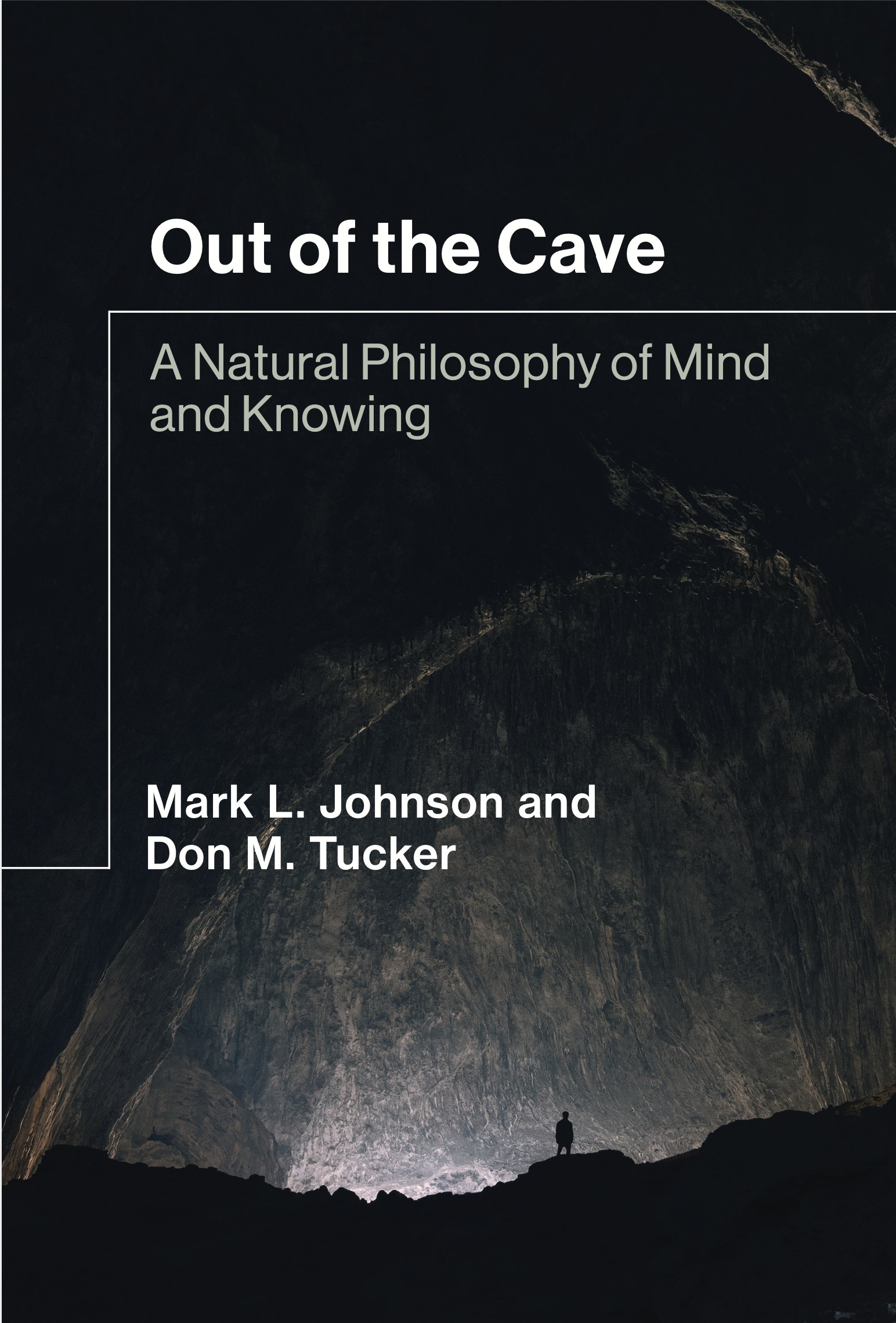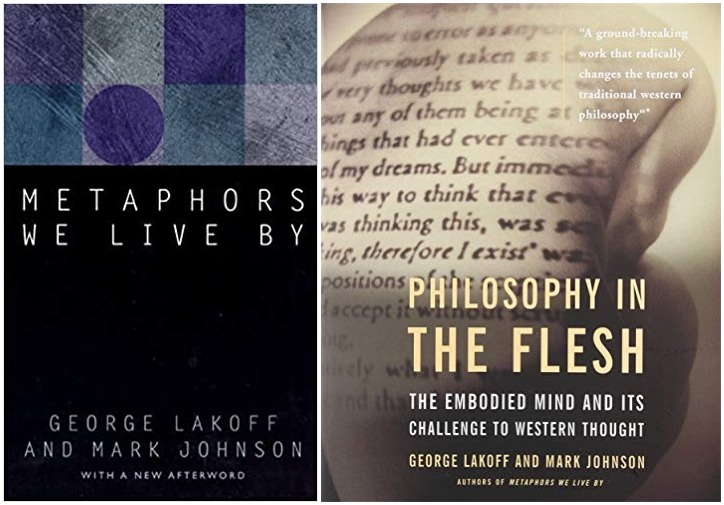 The MIT Press releases Out of the Cave: A Natural History of Mind and Knowing by Mark Johnson and Don Tucker on August 17.
The MIT Press releases Out of the Cave: A Natural History of Mind and Knowing by Mark Johnson and Don Tucker on August 17.
What do we know, and how do we know it? I can’t think of any more essential question to the human experience. Or to the scientific method.
Objectivity and subjectivity. Thoughts and emotions. Big ideas.
Mark Johnson and Don Tucker responded to my interview questions recently about their new book and the story behind it.
Jill Swenson: Mark, how did you and Don decide to work together on the book?
 Mark Johnson: Several years ago, Don contacted me to say that some of his neuroscience research supported, enriched, and extended some of my work on embodied cognition theory. We began to chat by email occasionally and soon discovered how much our general views were compatible and mutually reinforcing. This led to a series of conversations over lunch where we began to sketch the outline for Out of the Cave. We gradually found a way to blend Don’s research with my philosophical perspective on human experience, language, cognition, and values. These were exciting meetings for me, because Don could supply the relevant neuroscience research for some of the positions I had developed in earlier work.
Mark Johnson: Several years ago, Don contacted me to say that some of his neuroscience research supported, enriched, and extended some of my work on embodied cognition theory. We began to chat by email occasionally and soon discovered how much our general views were compatible and mutually reinforcing. This led to a series of conversations over lunch where we began to sketch the outline for Out of the Cave. We gradually found a way to blend Don’s research with my philosophical perspective on human experience, language, cognition, and values. These were exciting meetings for me, because Don could supply the relevant neuroscience research for some of the positions I had developed in earlier work.
Jill Swenson: How does this new theory of embodied knowing build upon the work you did with George Lakoff?
 Mark Johnson: George Lakoff and I got interested in the role of the body in the development of experience, thought, and values in the late 1970s. In our book Metaphors We Live By (1980) we saw that our more abstract concepts were defined by conceptual metaphors that had source domains drawn from sensory, motor, and affective processes, such as when we understand knowing metaphorically as seeing. We then realized that, having rejected metaphysical dualism and committed to a naturalistic approach, we had to expand this focus on embodiment to all our meaning-making processes, which led to our book Philosophy in the Flesh (1999). That book laid out substantial linguistic evidence for the embodiment of mind and meaning, but it also surveyed some of the non-linguistic evidence from psychology, linguistics, and the cognitive science of the day. That turned into a long complex book, but we realized that we were only scratching the surface of embodied meaning and that we needed to draw on cognitive and affective neuroscience to flesh out these processes of conceptualization and reasoning. Working with Don opened exciting new avenues for seeing exactly how our bodies and brains, in interaction with our environments, give rise to experience and thought. We were able to delve more deeply into the motivational control systems for processing objects and events, and we could now understand the crucial role of emotions and values in the whole experiential process.
Mark Johnson: George Lakoff and I got interested in the role of the body in the development of experience, thought, and values in the late 1970s. In our book Metaphors We Live By (1980) we saw that our more abstract concepts were defined by conceptual metaphors that had source domains drawn from sensory, motor, and affective processes, such as when we understand knowing metaphorically as seeing. We then realized that, having rejected metaphysical dualism and committed to a naturalistic approach, we had to expand this focus on embodiment to all our meaning-making processes, which led to our book Philosophy in the Flesh (1999). That book laid out substantial linguistic evidence for the embodiment of mind and meaning, but it also surveyed some of the non-linguistic evidence from psychology, linguistics, and the cognitive science of the day. That turned into a long complex book, but we realized that we were only scratching the surface of embodied meaning and that we needed to draw on cognitive and affective neuroscience to flesh out these processes of conceptualization and reasoning. Working with Don opened exciting new avenues for seeing exactly how our bodies and brains, in interaction with our environments, give rise to experience and thought. We were able to delve more deeply into the motivational control systems for processing objects and events, and we could now understand the crucial role of emotions and values in the whole experiential process.
Jill Swenson: Don, how does this new theory of embodied knowing build upon your previous work on the neuroscience of consciousness?
 Don Tucker: A key realization in human neuroscience is that the mind’s process is grounded in our bodily feelings and motives. Anatomically, it has gradually become clear that the limbic networks at the core of the cerebral hemispheres are important not only to emotions—how we feel—but also to organizing memory consolidation—how we remember what’s important. These functions—motive control and memory—were considered as two separate areas in clinical neuropsychology and in neuroimaging research. But there has been remarkable progress, particularly over the last decade or so, in understanding how we consolidate memories in each night’s sleep. This is achieved as the limbic areas interact in sleep and dreams with the widespread networks of the neocortex.
Don Tucker: A key realization in human neuroscience is that the mind’s process is grounded in our bodily feelings and motives. Anatomically, it has gradually become clear that the limbic networks at the core of the cerebral hemispheres are important not only to emotions—how we feel—but also to organizing memory consolidation—how we remember what’s important. These functions—motive control and memory—were considered as two separate areas in clinical neuropsychology and in neuroimaging research. But there has been remarkable progress, particularly over the last decade or so, in understanding how we consolidate memories in each night’s sleep. This is achieved as the limbic areas interact in sleep and dreams with the widespread networks of the neocortex.
From a functional point of view, the implication is that knowing is always emergent from feeling. When we rationally analyze a certain problem, we can strive for objectivity, and that’s essential to avoid subjective bias. But achieving that objectivity is not guaranteed by pretending to be objective, which is the assumption in much of how we teach science. Rather, because the process of knowing starts as a subjective one, organized around the emotional and motivational foundations of the embodied mind, then objectivity must be achieved through careful appreciation of subjective bias. Not assumed.
Jill Swenson: Can you describe your writing process of co-authoring a book?
Mark Johnson: As we talked over lunch and worked out an outline for the book, we could see which chapters relied more heavily on my previous research and what came from Don’s expertise in psychology and neuroscience. Don is also very philosophically oriented in the way he thinks about key issues, so that made it easier to work together productively. On the chapters that were primarily my responsibility, I sent drafts to Don, and he would send back corrections and additions, and we would talk through parts that were not clear or well-argued. Don did the same with the more scientifically oriented chapters. We would go back and forth many times to fine-tune our chapters. I think one chapter had 12 versions, but that was a bit extreme. I tended to take responsibility for trying to get smooth transitions for the whole book. Many of our extensive revisions came in response to numerous and helpful comments, criticisms, and suggestions. All in all, we got along very well and were in basic agreement about what needed to be changed and when we could call a chapter done, or done for now.
Jill Swenson: Why did you decide to write this as a natural philosophy?
 Mark Johnson: We called it a “natural philosophy” because we really liked that idea of a philosophy of nature—a more empirical and scientific take on experience. Natural philosophy classically referred to any empirical approach to the explanation of natural processes. Out of the Cave tries to blend science and philosophy into an empirically responsible method of inquiry. It says that we must pay close attention to science, but we also need the right kind of philosophical perspective to put the science in its proper role and to criticize its grounding assumptions where necessary. We are also trying to develop a scientific perspective that is existentially and morally meaningful, even as it is subject to critique and validation by communities of inquirers.
Mark Johnson: We called it a “natural philosophy” because we really liked that idea of a philosophy of nature—a more empirical and scientific take on experience. Natural philosophy classically referred to any empirical approach to the explanation of natural processes. Out of the Cave tries to blend science and philosophy into an empirically responsible method of inquiry. It says that we must pay close attention to science, but we also need the right kind of philosophical perspective to put the science in its proper role and to criticize its grounding assumptions where necessary. We are also trying to develop a scientific perspective that is existentially and morally meaningful, even as it is subject to critique and validation by communities of inquirers.
Jill Swenson: How does your new theory change our understanding of how the mind works?
Mark Johnson: This is pretty much the central focus of the book, and the answer is somewhat complex, but the basic story is this: We show why the hope for pristine (value-neutral) objectivity is a seriously mistaken and misleading project. We also challenge any view that presupposes a transcendent ego or center of selfhood, replacing that with a naturalistic view of experience, self, mind, meaning, and value. Knowing, as an ongoing activity of inquiry, is motivated, body-based, and rooted in emotions. Our chapters on the roots of thinking in motor control and motivational systems reveal the fact that all knowing is value-dependent and shaped by feelings.
Another key component of our account of how abstraction is possible, from a neural perspective. A concept is not an abstract entity, but rather a probability distribution of the experiential affordances of any object or event, and humans (like other animals) forage for sustenance and flourishing by projecting expectations for future experience and then checking those predictions against what is experienced. Our account is therefore completely from the bottom up—from the biological level of functional organization on up to our highest levels of abstract conceptualization and reasoning. We appropriate structures and processes of basic bodily (sensory and motor) activities for abstract thought.
Jill Swenson: How does the theory change the way we understand how our body and place in the world affects the way the mind works?
 Mark Johnson: I’ve tried to answer this a bit in the previous question, but I’ll add that for humans everything begins with a living biological organism, with an at least partially functioning brain, engaging its environment at every moment. So, all our experience, meaning, and cognition arise from patterns of bodily transaction with our surroundings, both physical, interpersonal, and cultural. We must jettison any radical separation of subjectivity and objectivity, mind and body, cognition and emotion, etc. We need a naturalistic, non-dualistic account of these as just dimensions of an ongoing process of organism-environment interaction.
Mark Johnson: I’ve tried to answer this a bit in the previous question, but I’ll add that for humans everything begins with a living biological organism, with an at least partially functioning brain, engaging its environment at every moment. So, all our experience, meaning, and cognition arise from patterns of bodily transaction with our surroundings, both physical, interpersonal, and cultural. We must jettison any radical separation of subjectivity and objectivity, mind and body, cognition and emotion, etc. We need a naturalistic, non-dualistic account of these as just dimensions of an ongoing process of organism-environment interaction.
Jill Swenson: What does the natural philosophy of mind and knowing tell us about the future, especially artificial intelligence?
Mark Johnson: I’ll leave this mostly to Don, with his expertise on neural modeling, artificial neural network theory, and connectionist models. But I will say that our new and ever developing information and modeling technologies require us to rethink what we mean by terms like meaning, thought, knowing, deliberation, valuing, and choice. All the recent attention to how we off-load cognitive tasks onto aspects of our environment (materials, systems, technologies, etc.) reveals that cognition is not just locked up in some private, interior realm of mind, but rather extends out into the world. I’m less sanguine about the future of these developments than I think Don is, because I wonder whether new technologies will ever incorporate the motivational and affective processes so crucial for human understanding and reasoning.
Jill Swenson: Well, Don, what do you say? Will artificial intelligence become part of the way we experience the world?
 Don Tucker: It already has. Many dinner table conversations are now woven together by Google searches, because access to internet-curated information is not only how we argue, but how we think. For many of my colleagues in business and engineering, discussions are multi-tasking with laptops, fully engaged in the meeting but simultaneously conducting searches—of the internet and their own archives—to bring relevant information into the conversation.
Don Tucker: It already has. Many dinner table conversations are now woven together by Google searches, because access to internet-curated information is not only how we argue, but how we think. For many of my colleagues in business and engineering, discussions are multi-tasking with laptops, fully engaged in the meeting but simultaneously conducting searches—of the internet and their own archives—to bring relevant information into the conversation.
As Mark says about off-loading, the embodied mind is now the extended mind, as cognition is increasingly expanded by digital resources. Yes, the motive controls for cognition are integral to the human mind, whereas they must be specified artificially for AI. And, of course, we may not want to allow AI to incorporate autonomous motive control, or reflective self-awareness, because we know what happened when Skynet became self-aware. The first imperative with self-awareness is self-defense. Scary as it is, the reality of neuromorphic emulation may soon be at hand. The realization that the mind is fully embodied—identical with its neural substrate—has an unexpected implication: if we can replicate that neural substrate, then we can replicate that mind. The technology for digital neuromorphic emulation is still primitive, but the scientific principles we understand so far suggest that there are no fundamental boundaries between biological minds and minds that achieve cognitive equivalence through other means.
